Tag : Art
February 23, 2021 by admin
Jewish Artists of Color: A Candid Conversation
Inspired in large part by a call to action put out by No Silence on Race last summer to build a more inclusive, anti-racist Jewish community in Canada, FENTSTER (Yiddish for ‘window’) gallery has focused on programming work by Black and Jewish artists — first in their street-front window gallery in downtown Toronto, exhibiting new work by photo-video artist Ella Cooper, followed by an online conversation and artist showcase that has been viewed over 500 times. Out of those initial projects, an idea was born to create a space specifically for Jewish Artists of Color to come together — a closed conversation that would be welcoming and safe, informal and intentional.
And so, FENTSTER curator Evelyn Tauben teamed up with No Silence on Race (whose founder — Sara Yacobi-Harris — is also a filmmaker, among many other things) to give shape to PRISM. Together, they assembled a diverse core team of JOC creatives from across North America — artists, performers, curators and producers from Toronto, Texas, New York and Vancouver. The PRISM core team includes Rabbinical student/theatre artist Kendell Pinkney, Carmel Tanaka – founder of one of Canada’s only Jewish queer trans organizations, JQT Vancouver, writer / cultural producer Devyani Saltzman, dancer/community organizer Adam McKinney and No Silence on Race’s Yacobi-Harris. Over the last months, this group has been dreaming up a context to allow fellow JOC artists and arts professionals to be able to come together with the hopes of building connections, artistic collaborations and community. Despite the limitations of the pandemic, the move to online gatherings presents possibly the best moment yet to begin to seed a new Jewish creative network.
(more…)- No Comments
January 26, 2021 by admin
Goddesses You Need to Meet •
Female deities were often represented in the polytheistic world of the ancient Near East, and many later evolved as part of biblical monotheism. Problem is, after the Babylonian exile they were increasingly suppressed and the one God in the Hebrew Bible and the rabbinical interpretations acquires a “female side” as opposed to a divine female partner. An exhibition
created at the Jewish Museum Hohenems in Austria, expanded now at the Frankfurt Jewish Museum, combines art depicting female elements in God concepts with their cultural-historical traces in the three monotheistic religions. Evidence comes from ancient archaeological figurines, medieval Hebrew Bible illustrations, Renaissance paintings of the Madonna and interpretations by renowned contemporary artists, including Helene Aylon. “You Gotta Believe: The Goddesses vs. Moses,” an animated video by Nina Paley, humorously explores the theme of ancient female deities.
juedischesmuseum.de/en/visit/detail/female-side-of-god
- No Comments
December 23, 2020 by Eleanor J. Bader
Art and Aid: an Interview with Margot Spindelman
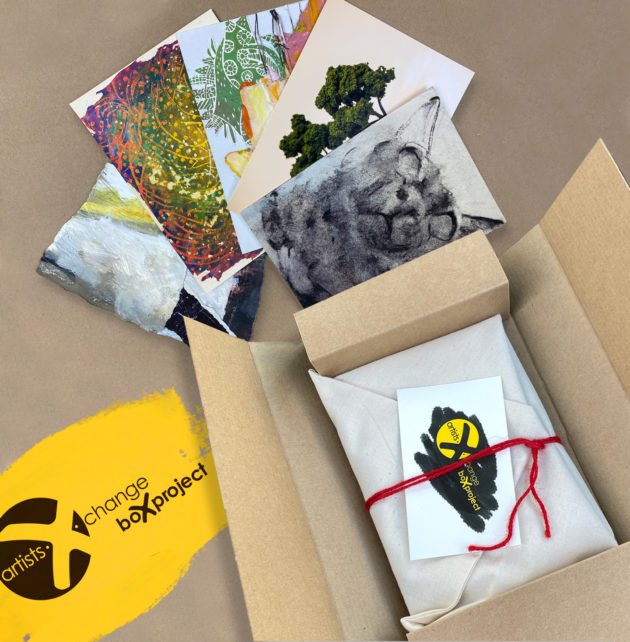
When crises hit — whether fire, flood, or global pandemic — righteous people mobilize by bringing food, water, clothing, medical care and emotional support to those in need. These mutual aid networks often do what governments do not: offer concrete help to communities long ignored by public agencies.
Not surprisingly, COVID has led to a surge in such networks, with individuals in every part of the country phoning isolated seniors, feeding the hungry, tutoring kids and helping society’s most vulnerable populations with everyday chores.
- No Comments
December 16, 2020 by admin
This Hanukkah, Illuminating the Power of Feminists
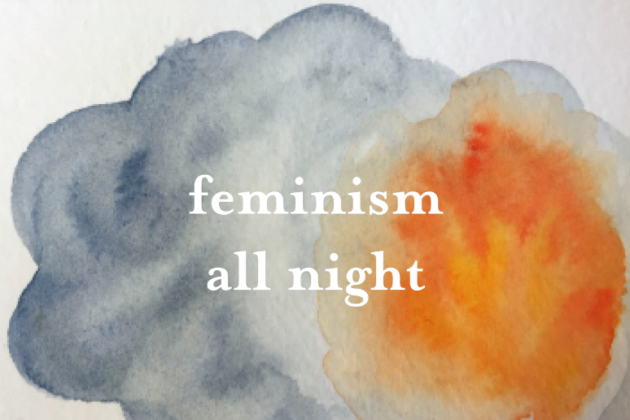
Four years ago, I sat in a communal Shavuot learning program. I recall thinking to myself, what is the Torah that the Jewish people need right now? The answer became crystal clear: it is feminism.
The next year, I decided to experiment and organize an event called Feminism All Night. The vision was inspired by the Jewish holiday of Shavuot and brought feminist thinkers together to teach and learn communally about feminism. The success was overwhelming, with over 100+ attendees and over 12 sessions that had us staying until 4 AM.
Since then, I have been cultivating this project by designing immersive feminist communal learning experiences centered on Jewish holidays. We hosted Feminism All Day for the holiday of Sukkot and expanded our events from Oakland to various cities, including Boston and Tel Aviv. Our community has grown to over 1500 people!
This year we decided to bring our vision of feminist Jewish learning to Chanukah. On the 7th Night of Chanukah on Rosh Chodesh Tevet is the traditional celebration of Chag haBanot (Eid al-Banat in Arabic), a North African Jewish Festival of the Daughters. The holiday elevates women’s power–the strength, wisdom and resilience of women throughout the ages. Women, young and elderly, would gather for a celebration together to delight in sweets, sing prayers, dance, and give gifts to each other, particularly gold coins and jewelry.
The holiday is associated with legendary and midrashic traditions or literary and historical traditions, about bold, wise, courageous and determined women who saved their people with their resourcefulness, wisdom, courageous hearts and heroism, and changed historical circumstances in antiquity.
Chag haBanot elevates the heroism and resourcefulness of brave, bold and wise women, such as Queen Esther, Judith daughter of Merari, or Hannah [sometimes Miriam], daughter of Matityahu. In times of danger to their people, they gathered courage, devotion, strength and resourcefulness, and acted in extraordinary ways that are recorded in the chronicles and told by the women on The Festival of the Daughters.
Feminism All Night is committed to creating space for feminist learning and particularly uplifting Mizrahi traditions in the Jewish world. Our programming has centered Mizrahi feminist educators from the beginning. We love celebrating the sacred traditions and teachings of Mizrahi communities and bringing them forth to the wider community.
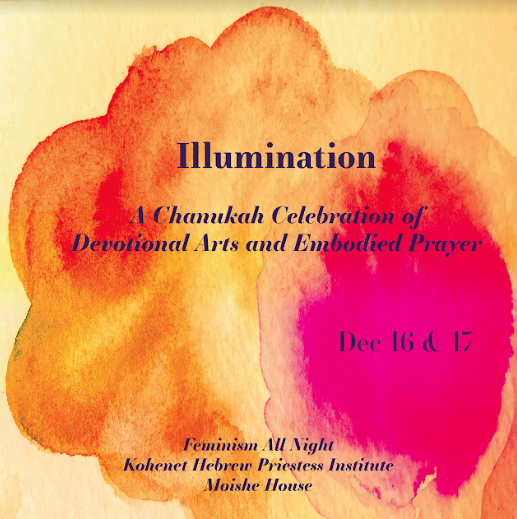
This year, on December 16th and 17th, we are hosting Illumination: A Chanukah Celebration of Devotional Arts and Embodied Prayer. Illumination is a collaboration between Hadar Cohen and Taya Mâ Shere. It is a partnership with Kohenet Hebrew Priestess Institute and is supported by Moishe House. The festival includes prayer, workshops and celebration. In honor of this celebration, we are featuring North African Jewish feminists–artists, teachers and spiritual leaders–on our Facebook and Instagram pages. Our programs are open to people of all genders and faiths and we invite you to join us–register here!
Some of our featured feminists include:
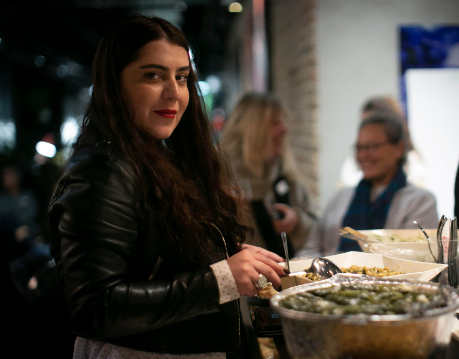
Sivan Tahel, a Moroccan activist and leader who was a lead organizer of Feminism All Night in Tel Aviv, January 2020, centered on Mizrahi Identity.
“Feminism is the mother of all struggles and everything connects to it. Feminism for me is solidarity, support networks of women, empowerment that is expressed in action, advancing other women and caring for their well-being, emotionally and financially. It is the ability to hear and listen to various strands of feminism, while respecting and embracing the diversity within the group of women. Feminism is the expansion of the feminist struggle with reference to power structures, ethnicity and status.”
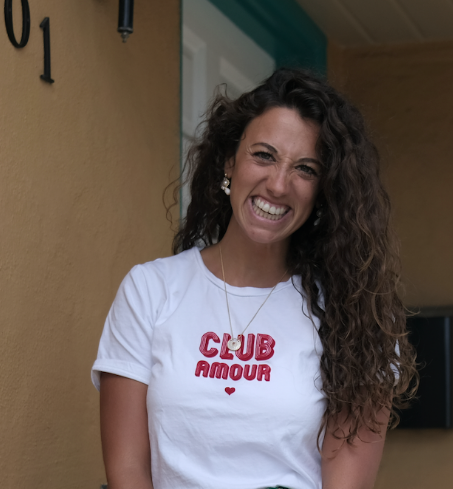
Nellie Alimi, a Tunisian and Algerian French artist who is working to preserve the North African rituals and traditions that she grew up with. Her family celebrated Eid Al Banat, and she will be sharing more about her familial lineage celebration at our Artistic Showcase.
“Feminism for me, is about elevating other women, showing a different type of leadership, embracing our own selves, not trying to fit into the white male model, speaking out truth, educating the world about strong women leaders and their challenges.”
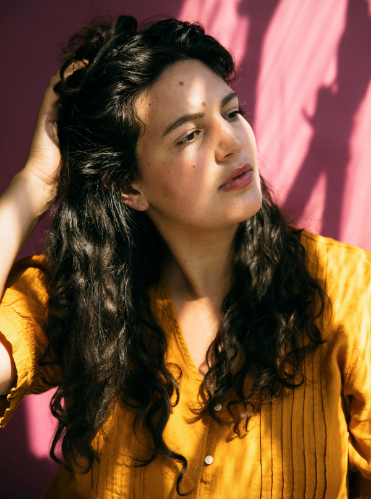
Daniela Labi, a Libyan feminist artist and community organizer. Daniela was one of the lead organizers for Feminism All Day 2019 in the Bay Area.
“To me, feminism means celebrating the true feminine power that lies within all of us. Feminism is the act of re-calibrating society so that we honor this power, lift it up, and use it to return to true alignment with g!d, the earth, and the universe. My mother was born and raised in Tripoli, Libya. She fled with her family in 1967, during the Six Day War, just months before she would’ve entered her last year of high school. For years, my ancestors lived in the deserts of Libya, and I feel the divine responsibility to capture their stories so that they are not lost to eurocentrism and whiteness.”
Hadar Cohen is a multimedia artist, educator and healer. She is the founder of Feminism All Night. To learn more about her work visit hadarcohen.me.
- No Comments
December 4, 2020 by Yona Zeldis McDonough
Saving Leonardo de Vinci’s “Lady with the Ermine”
September 1939 and Edith Becker sits with her hands trembling beneath the table where she’s seated before some of the most important men of the Alte Pinakoteck, one of Munich’s greatest museums. Usually, Edith’s work as a conservator keeps her ] behind the scenes, but today she’s been asked to identify and comment on paintings held in private collections across Poland. What she doesn’t know is that this is just the beginning of an extensive and highly organized plot to plunder Europe’s artwork and use it to glorify the Third Reich.
Fiction Editor Yona Zeldis McDonough talks to Laura Morelli about The Night Portrait, (William Morrow, $16.99) a novel that traces the fraught journey of Leonardo de Vinci’s famous Lady with the Ermine, and how this priceless work of art was ultimately saved.
YZM: How did the idea to write about this aspect of World War II come to you?
- No Comments
October 23, 2020 by admin
Meet the Black Jewish Artists in Lilith’s Digital Spotlight
This season of quarantine and anti-racist uprising, Lilith has been highlighting Black Jewish feminist artists— visual artists, dancers, musicians—in an exciting and original Instagram campaign. With theaters, concert halls, galleries and other performance spaces shuttered, connecting these talented artists with Lilith’s readers has been a bright spot in a bleak time. Follow Lilith’s Instagram and the Lilith blog for more treats like these!
Rachel Harrison-Gordon is an MFA/MBA candidate at NYU Tisch/Stern and a Sundance 2020 Blackhouse Fellow.
“To the Black girls everywhere, to the mixed girls, to the Black-Jewish girls—your life is special and valid. People will try to put you into a box so their world-view isn’t shook. Don’t let them do that, don’t let that effort subdue or censor who you are. We are all here and have something to offer.”
Ayeola Omolara Kaplan is a queer, Black, multimedia artist creat- ing artworks that empower and educate the Black diaspora and those interested in supporting its liberation… Her artwork consists of paintings, drawings, and films that aim to energize people as well as challenge their current and past perceptions of reality.
“The movement for justice needs to not only include but also amplify the voices of incarcerated people, especially Black incarcerated people. We can never be free while our family members are in cages. There is no healing behind bars.”
Nirit Takele is an Israeli artist who illustrates the daily life of the Beta-Israel community and contemporary Israeli reality, and finds inspiration in old Ethiopian sagas and folk tales remembered from her youth.
“I say this to myself and to anyone who wants to achieve something—always strive towards the goal and take the small steps that will bring you closer to it.”
Jordana Daumec was born in New York City. She trained at Studio Maestro in New York City and Canada’s National Ballet School. Jordana joined The National Ballet of Canada as an RBC Apprentice in 2003 and was promoted to First Soloist in 2015.
“I make my husband and me a loaf [of challah] every week. Such a great way to spend a day. I love the smell of the baking bread, you can see the love that you put into it and it comes out so delicious.”
Jessica Valoris is a multidisciplinary installation artist who weaves together sound, collage, painting, sculpture and facilitated ritual to build installations and experiences that have been described as sacred, intentional, and activated.
“There will always be something important that needs to be addressed, mediated, serviced, facilitated. There is always more work to be done. Saying no is a practice of pausing, recalibrating, and saying yes to myself.”
- No Comments
October 15, 2020 by Chanel Dubofsky
Connecting Jewish Tradition with Black Fugitive Legacies
This autumn, the parking lot of the Halcyon Arts Lab in Washington DC hosted a special sukkah built by visual artist Jessica Valoris. Though its materials—recycled cardboard, paper, bamboo and plant materials—are all things you might expect to find in your average sukkah. this one is anything but; it’s a structure that confronts the past and present, invites us to engage with possibilities of the future. Lilith spoke with Valoris about creating, Black fugitivity, spirituality, and more.





- No Comments
October 8, 2020 by admin
Clamor in the Desert: A Shelter for Anyone Who Feels Forlorn
We are living in uncertain times. In Argentina, my home, the flights are almost totally suspended and the feeling of confinement and distance becomes more evident.
I am an artist born in this country to Auschwitz survivors. Their story of exile and loss of their homeland, their language, their culture, marked my life and of course my art. I always felt some responsibility to try to renew and make their ancestors’ culture live in their new chosen land. That choice was obviously by default since they arrived in Argentina clandestinely as refugees.
Thus, borders, migrations and exiles, human rights, and the mother tongue have always been an essential core in my artistic concern, since I consider that art has the gift, but also the commitment to transmit and contribute to the formation of culture and popular thinking.
(more…)- No Comments
September 2, 2020 by Eleanor J. Bader
“For Me, Art Has Always Been a Protest”
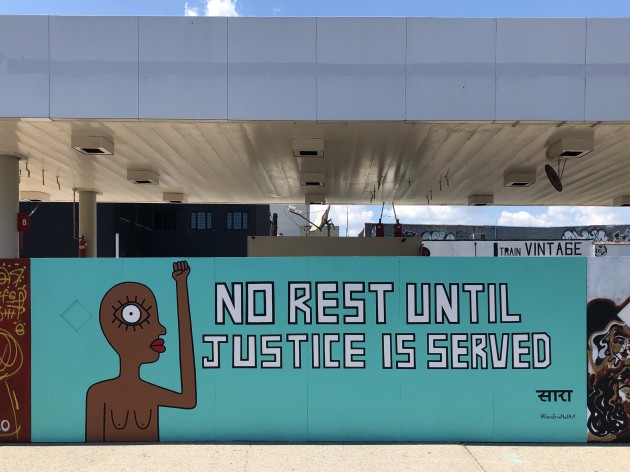 The block-long mural is called the Wall of Justice and it began to take shape on Brooklyn’s Fourth Avenue in Gowanus within days of the police shooting of George Floyd. (more…)
The block-long mural is called the Wall of Justice and it began to take shape on Brooklyn’s Fourth Avenue in Gowanus within days of the police shooting of George Floyd. (more…)
- No Comments
August 25, 2020 by admin
Black Jewish Women Artists You Should Know… Ayeola Omolara Kaplan
Art–whether it be dancing, painting, drawing, film–creates a space for self-examination, helping us to envision possible futures, and better versions of ourselves. And the Jewish month of Elul is traditionally an opportunity for introspection before the High Holidays of Rosh Hashanah and Yom Kippur.
Recognizing the power of art to be transformative, Lilith is highlighting Black Jewish women artists in this time leading up to and through Elul. On Lilith’s platforms you’ll have a chance to experience, share, and celebrate their work.
You can also participate by letting us know (at info@Lilith.org) Black Jewish women creators we should include!
- No Comments
 Please wait...
Please wait...